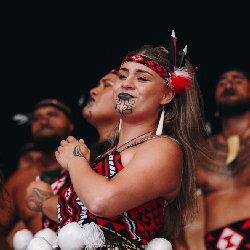Rosa Flood
Bachelor of Design

Waikato-Maniapoto, Ngāti Kahungunu, Ngāti Porou, Te Arawa
It’s been a kind of homecoming for Tirama, as her whānau have a long legacy and history with Waikato University.

Tirama Te Marino Bramley (Waikato-Maniapoto, Ngāti Kahungunu, Ngāti Porou, Te Arawa) is in her second year of study at Te Whare Wānanga O Waikato (University of Waikato) studying a Bachelor of Design degree.
She started out at AUT, but the challenge of living in Auckland during Covid-19 lockdown lost its shine, and the friendly, supportive Waikato University campus beckoned.
In 2022, Tirama started her bachelor’s at Waikato, majoring in Communication Design and Te Reo Māori.
It’s been a kind of homecoming for Tirama, as her whānau have a long legacy and history with Waikato University.
“I was born and bred in Waikato,” says Tirama. “My mum has six siblings and they have all graduated with a bachelor’s or master’s from Waikato. My Nan was a lecturer at the University for years, and led and performed in the Te Whare Wānanga O Waikato kapa haka rōpū (group).”
Tirama’s grandmother, Dr Te Rita Papesch, is an educator and kapa haka icon, a matriarch who has inspired generations of her whānau on their educational journey, completing her Bachelor of Arts at Waikato in 1981, followed by a Master of Arts in 1990.
“She started the whole Waikato University ‘chain’ between all her moko and children,” says Tirama. “So that’s why I came to Waikato, to keep that legacy going.”
Although she has a passion for art, creativity and “all things design”, Tirama hadn’t studied design at high school.
Applying for the Bachelor of Design at Waikato was “a leap of faith”, but one she has not regretted.
She’s enjoyed learning about the principles of design, exploring everything from colour theory to typography.
Her favourite design paper was Design History and her tutor for that class, Hazel Burroughs, was “amazing”.
A fluent speaker of te reo Māori, Tirama grew up immersed in her language.
“I grew up in a te reo Māori speaking home, and it is my first language,” says Tirama, who attended kōhanga reo as a child, and several Waikato kura kauapa including Tōku Māpihi Maurea Kura Kaupapa Māori in Silverdale and Ngā Taiātea Wharekura in Rotokauri.
She enrolled in intermediate and advanced Te Reo Māori papers at Waikato.
“My Māori papers and my Māori classes were a safe haven for me; they kept me grounded.”
Lecturers and classmates created a welcoming, supportive environment for learning.
“Growing up in a Māori world, where your whole perspective is through a Māori lens, it’s good to be a class with the same kind of mindset and perspective.”
Both majors come together when she is able to put a te ao Māori (Māori world view) lens on her design work.
“A lot of my mahi, whether it is for projects or presentations, I try to incorporate anything Māori into my design work. Our last project was making a website to showcase a business; I made up this Māori business teaching reo and waiata Māori and created a website for that. I got to use photos of my family, and myself. That’s what I do to put Māori perspective into my study.”
Tirama is active in kapa haka, and is part of the Te Hekenga ā Rangi rōpū from Maketū.
The group placed in the top 12 at Te Matatini 2023 - their first performance at the prestigious national kapa haka festival.
Juggling training and assignments in the six months leading up to Te Matatini was “tough”, recalls Tirama.
“I’d finish University for the week and have to pack my bags and travel all the way to Maketū, then travel back home on Sunday with no voice, tired, my body is sore, then back for Uni on Monday; and repeat, week after week.”
Qualifying, then placing in the top 12 in the motu (country) was a great feeling.
“I felt super happy and grateful,” says Tirama. “Our teachers pushed us really hard and had high expectations, but it all paid off.”
Tirama says the support of her whānau and friends have helped with both her studies and her kapa haka practice.
“My mum, my siblings, my dad, my partner and my close friends have all been there for me.”
Her uncle, Associate Professor Te Taka Keegan from the School of Computing and Mathematical Sciences, has also been a huge supporter during her university studies.
“He’s always on my case, making sure I pass my papers and go to class,” laughs Tirama.
She’s also picked up some work from him as a research assistant.
“All the research projects I’ve done have been in the School of Computing and Mathematical Sciences, and I’ve learned heaps. Part of my role is to help with the reo, or put my Māori perspective into the research, so I’ve enjoyed that.”

You are currently viewing the website as an international visitor, you might want to change to domestic.
You're an international student if you are:
You're a domestic student if you are: